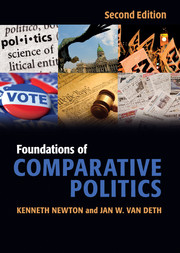Book contents
- Frontmatter
- Contents
- List of briefings
- List of fact files
- List of controversies
- List of tables
- List of figures
- Preface to the second edition
- Acknowledgements
- List of abbreviations and acronyms
- Key terms and concepts
- How to use this book
- Introduction
- PART I The state: origins and development
- PART II The polity: structures and institutions
- PART III Citizens, elites and interest mediation
- PART IV Policies and performance
- 14 Political ideologies: conservatism, liberalism, Christian democracy and socialism
- 15 Decision making
- 16 Defence and security
- 17 Welfare
- 18 The future of the democratic state
- Postscript: How and what to compare?
- Glossary of key terms
- Index of names
- Index of subjects
16 - Defence and security
from PART IV - Policies and performance
Published online by Cambridge University Press: 05 June 2012
- Frontmatter
- Contents
- List of briefings
- List of fact files
- List of controversies
- List of tables
- List of figures
- Preface to the second edition
- Acknowledgements
- List of abbreviations and acronyms
- Key terms and concepts
- How to use this book
- Introduction
- PART I The state: origins and development
- PART II The polity: structures and institutions
- PART III Citizens, elites and interest mediation
- PART IV Policies and performance
- 14 Political ideologies: conservatism, liberalism, Christian democracy and socialism
- 15 Decision making
- 16 Defence and security
- 17 Welfare
- 18 The future of the democratic state
- Postscript: How and what to compare?
- Glossary of key terms
- Index of names
- Index of subjects
Summary
What would happen if everybody did just whatever they liked? Why do we need police, courts, and armies? Can't people take care of their own business without violence and oppression? Do citizens need protection against the consequences of GM food, atomic energy, or toxic paint? Is the exercise of force compatible with democracy's claim to peace and justice?
Living together is based on mutual understanding and the acceptance of certain social rules, conventions and habits, yet these are not enough on their own to maintain peace and harmony. In the end, severe conflicts of interest can be resolved only by force. Therefore, the traditional tasks of government include the enforcement of rules and the regulation of social life. Governments preserve law and order by protecting their citizens from internal disorder (internal security), and their country from foreign aggression (external security). Increasingly they also offer protection against potentially harmful products such as unsafe cars, dangerous food additives and toxic substances. Governments also regulate the construction and operation of many other things – from atomic plants to electric toasters – to protect their citizens against the dangers of modern life.
In this chapter, we examine the efforts of governments to protect citizens from assault, interference and physical danger of many kinds. The provision of social security to protect citizens against the consequences of illness, poverty and unemployment is discussed in chapter 17.
- Type
- Chapter
- Information
- Foundations of Comparative Politics , pp. 337 - 359Publisher: Cambridge University PressPrint publication year: 2009



